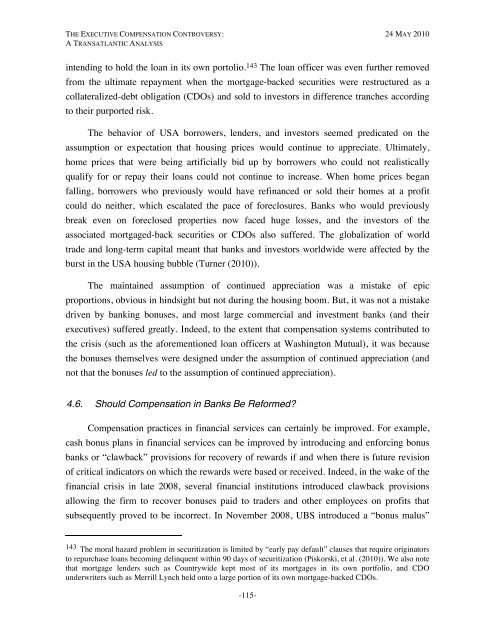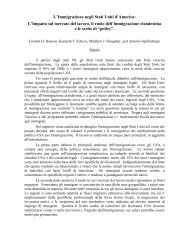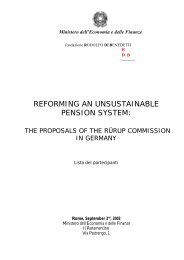The Executive Compensation Controversy - Fondazione Rodolfo ...
The Executive Compensation Controversy - Fondazione Rodolfo ...
The Executive Compensation Controversy - Fondazione Rodolfo ...
You also want an ePaper? Increase the reach of your titles
YUMPU automatically turns print PDFs into web optimized ePapers that Google loves.
THE EXECUTIVE COMPENSATION CONTROVERSY: 24 MAY 2010A TRANSATLANTIC ANALYSISintending to hold the loan in its own portolio. 143 <strong>The</strong> loan officer was even further removedfrom the ultimate repayment when the mortgage-backed securities were restructured as acollateralized-debt obligation (CDOs) and sold to investors in difference tranches accordingto their purported risk.<strong>The</strong> behavior of USA borrowers, lenders, and investors seemed predicated on theassumption or expectation that housing prices would continue to appreciate. Ultimately,home prices that were being artificially bid up by borrowers who could not realisticallyqualify for or repay their loans could not continue to increase. When home prices beganfalling, borrowers who previously would have refinanced or sold their homes at a profitcould do neither, which escalated the pace of foreclosures. Banks who would previouslybreak even on foreclosed properties now faced huge losses, and the investors of theassociated mortgaged-back securities or CDOs also suffered. <strong>The</strong> globalization of worldtrade and long-term capital meant that banks and investors worldwide were affected by theburst in the USA housing bubble (Turner (2010)).<strong>The</strong> maintained assumption of continued appreciation was a mistake of epicproportions, obvious in hindsight but not during the housing boom. But, it was not a mistakedriven by banking bonuses, and most large commercial and investment banks (and theirexecutives) suffered greatly. Indeed, to the extent that compensation systems contributed tothe crisis (such as the aforementioned loan officers at Washington Mutual), it was becausethe bonuses themselves were designed under the assumption of continued appreciation (andnot that the bonuses led to the assumption of continued appreciation).4.6. Should <strong>Compensation</strong> in Banks Be Reformed?<strong>Compensation</strong> practices in financial services can certainly be improved. For example,cash bonus plans in financial services can be improved by introducing and enforcing bonusbanks or “clawback” provisions for recovery of rewards if and when there is future revisionof critical indicators on which the rewards were based or received. Indeed, in the wake of thefinancial crisis in late 2008, several financial institutions introduced clawback provisionsallowing the firm to recover bonuses paid to traders and other employees on profits thatsubsequently proved to be incorrect. In November 2008, UBS introduced a “bonus malus”143 <strong>The</strong> moral hazard problem in securitization is limited by “early pay default” clauses that require originatorsto repurchase loans becoming delinquent within 90 days of securitization (Piskorski, et al. (2010)). We also notethat mortgage lenders such as Countrywide kept most of its mortgages in its own portfolio, and CDOunderwriters such as Merrill Lynch held onto a large portion of its own mortgage-backed CDOs.-115-









